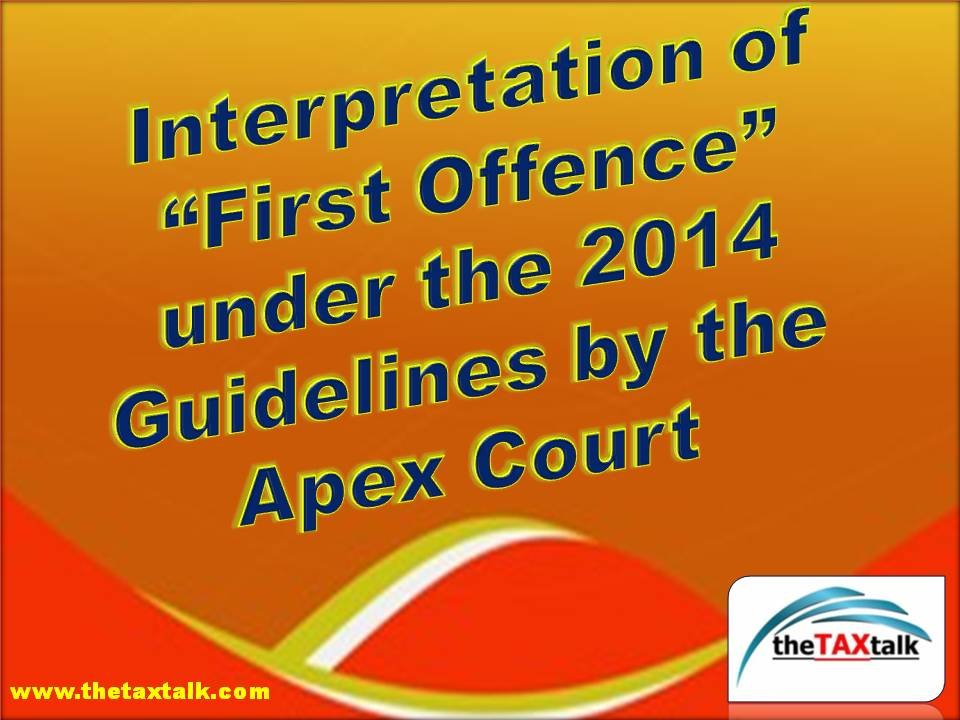![]()
Interpretation of “First Offence” under the 2014 Guidelines by the Apex Court
In a case before Supreme court in Vinubhai Mohanlal Dobaria v. Chief Commissioner of Income Tax, (Civil Appeal No. 1977 of 2025, arising out of SLP (C) No. 20519 of 2024, Supreme Court, decided on February 7, 2025), the issue was with regard to Interpretation of “First Offence” under the 2014 Guidelines, as under:
Issues in Question:
When does an offence under Section 276CC of the Income Tax Act, 1961 occur?
Does the offence take place on the actual date of filing the belated return, or
On the day immediately after the due date prescribed under Section 139(1) when the return remains unfiled?
Meaning of “First Offence” under the 2014 Guidelines
The issue before the court was whether the appellant’s failure to file his return for AY 2013-14 within the due date should be treated as a first offence under Clause 8(ii) of the 2014 Guidelines for Compounding of Offences?
Facts of the Case:
The appellant, an individual earning salary income and profit from a partnership firm, filed his income tax returns belatedly for multiple years:
AY 2011-12: Due date – 30.09.2011, filed on 04.03.2013.
AY 2013-14: Due date – 31.10.2013, filed on 29.11.2014.
Proceedings for AY 2011-12:
A show cause notice under Section 276CC was issued on 27.10.2014 for AY 2011-12.
The appellant’s compounding application was accepted under the 2008 Guidelines, allowing him to avoid prosecution.
Proceedings for AY 2013-14:
Another show cause notice was issued on 12.02.2015 for AY 2013-14.
The appellant applied for compounding under the 2014 Guidelines, explaining that the delay was due to financial constraints.
The application was rejected by the Chief Commissioner of Income Tax (CCIT), Vadodara, on 14.02.2017, on the ground that the appellant had already faced proceedings under Section 276CC for AY 2011-12, and therefore the AY 2013-14 default was not a “first offence.”
High Court’s Decision:
The Gujarat High Court upheld the rejection, holding that the show cause notice for AY 2011-12 had been issued before the appellant filed his return for AY 2013-14, making it a subsequent offence and ineligible for compounding.
Supreme Court’s Ruling:
Date of Offence under Section 276CC
The offence under Section 276CC occurs immediately after the due date under Section 139(1) if the return is not filed on time, regardless of the actual filing date.
Interpretation of “First Offence” under the 2014 Guidelines
Since the return for AY 2013-14 was filed before the show cause notice for that year (12.02.2015), it qualified as a “first offence” under Clause 8(ii) of the 2014 Guidelines.
The High Court misinterpreted the timeline by incorrectly considering the 2011-12 show cause notice as a factor for AY 2013-14.
Final Directions:
The Supreme Court set aside both the Gujarat High Court’s order and the Chief Commissioner’s rejection of the compounding application.
The appellant was allowed to file a fresh compounding application, which must be decided within four weeks by the competent authority.
Pending trial court proceedings were stayed, and if compounding was accepted, the trial would stand abated. If rejected, the trial would continue.
The copy of the order is as under:


